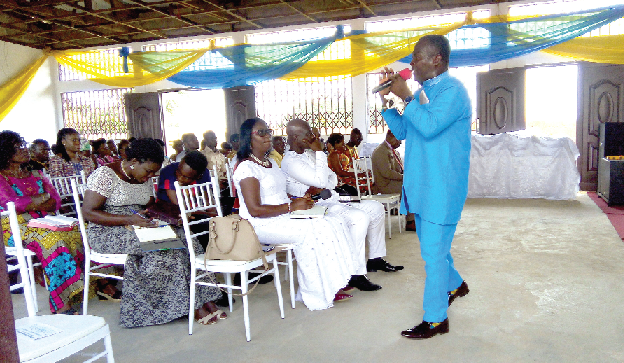
14 Receive certificates in Environmental Sanitation and Waste Management
The first batch of 14 students who undertook a certificate course in Environmental Sanitation and Waste Management from the Kwame Nkrumah University of Science and Technology (KNUST) Africa Institute of Sanitation and Waste Management (K-AISWAM) at Adjiringano in Accra has graduated.
The K-AISWAM, a centre of excellence in waste and sanitation management education in Ghana, is a partnership between the KNUST and Zoomlion/Jospong Group of Companies.
It was established in 2013 to respond to the problems of the management of waste and sanitation in the country. Zoomlion Company Limited has constructed a multi-million dollar faecal treatment plant that converts faecal matter into power.
Why K-AISWAM
The K-AISWAM was, therefore, established to provide an integrated sustainable solution to the problem of sanitation and waste management confronting the country, since training the requisite human resources was critical.
The Executive Chairman of Jospong Group of Companies, Mr J.S. Agyapong, who addressed the graduation ceremony, explained that K-AISWAM was perceived with the aim of making Ghana the hub of waste and sanitation management education in Africa.
Additionally, he said the aim of K-AISWAM was to build intellectuals to focus on sanitation and was, therefore, hopeful that the pioneers of the institute would move to other countries to develop a workable sanitation model to improve on their sanitation.
Faecal Plant
Mr Agyapong announced that Zoomlion Company Ltd had constructed a multi-million dollar faecal treatment plant that would convert faecal matter into power.
The plant set to be inaugurated on November 25, 2016, is described as the first-ever in West Africa and is expected to generate 500kw of energy from faecal matter to complement the country’s search for alternative sources of energy.
Mr Agyapong explained that the plant was part of the vision of the company to improve sanitation in the country.
10 years of Zoomlion
Mr Agyapong expressed the hope that the pioneer graduates would serve as consultants to seven African countries where Zoomlion had subsidiaries.
He said since the establishment of Zoomlion Company Ltd 10 years ago, it had chalked up many successes, citing the construction of a compost facility at Adjen Kotoku, the setting up of a medical waste treatment plant at Teshie and two waste management transfer stations at Teshie and Achimota.
Mr Agyapong added that the company had acquired 400 acres at Medie to construct a school to target the sub-region, where it would offer education and human resource development.
He noted that all that the company had done showed the passion and vision that it had for waste management.
‘Bola’ as cash
Mr Agyapong recalled the difficulties he had convincing people to share in his vision to deal with waste in the country.
“Those days, it was ‘bola’ but today, it is waste. Today, ‘bola’ business is not ‘bola’; it is serious cash and this is what the company stands for,” he told the gathering.
He said the company was poised to develop the country’s sanitation to become a reference point for other countries, “and therefore, it is in the right direction that we pursue this agenda for the betterment of this country”.
Industry-academia collaboration
The Pro-Vice-Chancellor of the KNUST, Prof. Rev. Charles Ansah, said K-AISWAM was the product of industry-academia collaboration that sought to fill a major void in the areas of education and management of sanitation and waste.
“The K-AISWAM offers academia, industry and the community one critical opportunity to learn, understand, appreciate and address the issues of sanitation and waste management holistically in order to evolve the appropriate synergies that would assure a feasible, lasting and sustainable solution to our endemic and enduring challenges of sanitation and waste management,” he said.
Admission requirements
Prof. Rev. Ansah advised K-AISWAM to move away from insisting on qualifications and specialised admission requirements because, “The real movers and shakers of sanitation and waste management in Ghana are the uneducated and not-so-educated sanitation and waste management staff and employees of the metropolitan, municipal and district assemblies (MMDAs).
“The institute must specifically target them and formulate custom-made capacity-building programmes for them so that their knowledge can be improved and their capacities built to enable Ghanaians to have real practical benefit from the institute’s existence,” he advised.
Protection of environment
The Dean of Engineering of the University of Western Ontario, Canada, Prof. Andrew N. Hrymak, who addressed the students, said protecting the environment “is something that we all hold close to our hearts and mind”.
He charged the students to use the knowledge acquired at the institute to help protect the environment and expressed the determination of the University of Western Ontario, Canada, to continue to partner the institute for the achievement of its objectives
